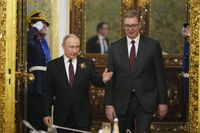During a recent visit to Moscow, Serbian President Aleksandar Vucic received several gifts from Russian President Vladimir Putin, including a Soviet submachine gun, commonly referred to as a 'pepesha'. Vucic was one of the few European leaders present at the Russian Victory Day celebrations, which commemorate the Soviet Union's victory over Nazi Germany during World War II.
The Victory Day celebrations took place on May 9, 2025, with Vucic attending alongside Slovak Prime Minister Robert Fico, Milorad Dodik, the President of the Republika Srpska in Bosnia and Herzegovina, and Zeljka Cvijanovic, representing the Serbs in the Presidency of Bosnia and Herzegovina. According to Tanjug, Vucic received a variety of gifts from Putin, including a book titled 'Russian Pantheon. Benefit, Honor and Glory', a set of weapons that featured a PPSz-41 submachine gun, a knife, and a flask, as well as a 'Pobieda-80' watch, produced in St. Petersburg as part of a limited edition of 80 copies to mark the 80th anniversary of the victory over Hitler's Germany. Additionally, Vucic, known for his appreciation of wine, was given a selection of Russian wines.
The Serbian president's participation in the Moscow parade was controversial, particularly given Serbia's aspirations for European Union (EU) membership. Following the celebrations, Vucic held his first official talks with Putin since Russia's invasion of Ukraine in 2022, where the main topic of discussion was energy cooperation between the two nations.
Commenting on the visit, the Serbian newspaper 'Danas' noted that Vucic needed to preserve his reputation, especially among radical patriots who support Russia in the ongoing war against Ukraine. The newspaper suggested that Vucic's foreign policy appears increasingly aligned with domestic pressures, as he struggles to manage the situation in Serbia.
For over six months, Serbia has been experiencing nationwide protests sparked by a tragedy at a train station in Novi Sad, where 16 people lost their lives. Protesters accuse the government of corruption and negligence, and student-led demonstrations have called for the dissolution of parliament and early elections.
'Danas' also pointed out that Vucic's trip to Moscow could jeopardize Serbia's efforts to join the EU. Polish Prime Minister Donald Tusk remarked that it is "inconceivable for someone from this part of the world to stand in Red Square and celebrate the end of the war together with those who are currently waging it in Ukraine." This sentiment reflects the broader concerns within the EU regarding Serbia's alignment with Russia.
In a recent interview on May 10, 2025, Serbian Foreign Minister Marko Djuric assured that Vucic's visit to Moscow would not disrupt Serbia's European integration or lead to sanctions. He stated that during a summit of EU foreign ministers in Warsaw, he received confirmation that the European Commission is committed to helping Serbia achieve significant progress toward full EU membership.
Serbia applied for EU membership in December 2009 and gained candidate status in March 2012. Accession negotiations began in January 2014, with 22 of the 35 negotiating chapters currently open. Since the onset of the Russian invasion of Ukraine in February 2022, Serbia has accepted thousands of Ukrainian refugees, condemned Russian aggression multiple times, and provided humanitarian aid to Kyiv. However, the government in Belgrade continues to maintain high-level contacts with Russia and refuses to join the EU sanctions imposed on the country.
As the political landscape in Serbia becomes increasingly complex, Vucic's recent visit to Moscow serves as a reminder of the delicate balance he must maintain between domestic pressures and international relations. The gifts from Putin, while seemingly innocuous, symbolize a deeper connection that could have significant implications for Serbia's future on the European stage.

